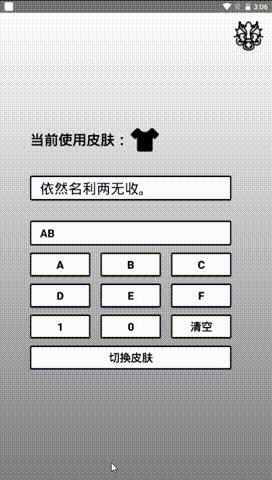解决使用skin-support换肤框架无法对NoticeView文字颜色和背景进行切换
Posted Steven Jon
tags:
篇首语:本文由小常识网(cha138.com)小编为大家整理,主要介绍了解决使用skin-support换肤框架无法对NoticeView文字颜色和背景进行切换相关的知识,希望对你有一定的参考价值。
可是!没有那么多可是!
你当人干柴烈火,人家当你干炒牛河。
效果图:

如何解决?
使用NoticeView布局文件:
...
<com.jon.skindemo.NoticeView
android:id="@+id/nv_notices"
android:layout_width="400dp"
android:layout_height="wrap_content"
android:background="@drawable/input_bg"
android:layout_marginTop="40dp"
android:paddingStart="20dp"
android:paddingEnd="20dp"
app:nvTextColor="@color/textColor"
app:nvTextSize="28sp"
app:nvTextGravity="left"
app:nvInterval="4000"
app:nvTextMaxLines="2"/>
...
从上面可以看出,我们只需要改变background和nvTextColor这两项属性就可以实现根据当前肤色动态切换文字颜色和背景。
回到NoticeView的源码中:
nvTextColor在哪个地方被使用的呢?
在TextFactory内部类下的makeView()方法下被使用的:
void resolve(TypedArray ta) {
lines = ta.getInteger(R.styleable.NoticeView_nvTextMaxLines, lines);
size = ta.getDimension(R.styleable.NoticeView_nvTextSize, size);
color = ta.getColor(R.styleable.NoticeView_nvTextColor, color);
gravity = ta.getInteger(R.styleable.NoticeView_nvTextGravity, gravity);
}
@Override
public View makeView() {
TextView tv = new TextView(getContext());
tv.setTextSize(TypedValue.COMPLEX_UNIT_PX, size);
tv.setMaxLines(lines);
if (color != 1) {
tv.setTextColor(color);
}
tv.setEllipsize(TextUtils.TruncateAt.END);
tv.setGravity(Gravity.CENTER_VERTICAL | gravity);
tv.setLayoutParams(new LayoutParams(LayoutParams.MATCH_PARENT, LayoutParams.MATCH_PARENT));
return tv;
}
那么makeView()又被谁调用了呢?
被NoticeView父类的父类ViewSwitcher调用:
private View obtainView() {
View child = mFactory.makeView();
LayoutParams lp = (LayoutParams) child.getLayoutParams();
if (lp == null) {
lp = new LayoutParams(LayoutParams.MATCH_PARENT, LayoutParams.WRAP_CONTENT);
}
addView(child, lp);
return child;
}
而且还被调用两次:
/**
* Sets the factory used to create the two views between which the
* ViewSwitcher will flip. Instead of using a factory, you can call
* {@link #addView(android.view.View, int, android.view.ViewGroup.LayoutParams)}
* twice.
*
* @param factory the view factory used to generate the switcher's content
*/
public void setFactory(ViewFactory factory) {
mFactory = factory;
obtainView();
obtainView();
}
因此,可以得出一个结论,makeView()下的TextView会有两个,到时切换文字颜色时需操作两个TextView:
//用List存放这两个TextView的引用
List<TextView> textViews = new ArrayList<>();
//在return tv之前添加引用
@Override
public View makeView() {
TextView tv = new TextView(getContext());
....
textViews.add(tv);
return tv;
}
//切换文字颜色
if (mDefaultFactory.textViews.size() == 2) {
mDefaultFactory.textViews.get(0).setTextColor(color);
mDefaultFactory.textViews.get(1).setTextColor(color);
}
到这里,NoticeView文字颜色就可以任意切换了,对于其背景切换就更简单了,Android-skin-support文档给出了一个示例Android-skin-support#自定义view换肤,可以参考这个示例代码,传送门SkinCompatAutoCompleteTextView
NoticeView修改全部代码
public class NoticeView extends TextSwitcher implements SkinCompatSupportable {
private static final int[] TINT_ATTRS = {
android.R.attr.background
};
private int mTextColorResId = INVALID_ID;
private int mBackgroundResId = INVALID_ID;
private Animation mInUp = anim(1.5f, 0);
private Animation mOutUp = anim(0, -1.5f);
private List<String> mDataList = new ArrayList<>();
private int mIndex = 0;
private int mInterval = 4000;
private int mDuration = 900;
private Drawable mIcon;
private int mIconTint = 0xff999999;
private int mIconPadding = 0;
private int mPaddingLeft = 0;
private boolean mIsVisible = false;
private boolean mIsStarted = false;
private boolean mIsResumed = true;
private boolean mIsRunning = false;
private final TextFactory mDefaultFactory = new TextFactory();
private final Runnable mRunnable = new Runnable() {
@Override
public void run() {
if (mIsRunning) {
show(mIndex + 1);
postDelayed(mRunnable, mInterval);
}
}
};
public NoticeView(Context context) {
this(context, null);
}
public NoticeView(Context context, AttributeSet attrs) {
super(context, attrs);
initWithContext(context, attrs);
setInAnimation(mInUp);
setOutAnimation(mOutUp);
setFactory(mDefaultFactory);
mInUp.setDuration(mDuration);
mOutUp.setDuration(mDuration);
}
private void initWithContext(Context context, AttributeSet attrs) {
TypedArray a = context.obtainStyledAttributes(attrs, R.styleable.NoticeView);
mIcon = a.getDrawable(R.styleable.NoticeView_nvIcon);
mIconPadding = (int)a.getDimension(R.styleable.NoticeView_nvIconPadding, 0);
boolean hasIconTint = a.hasValue(R.styleable.NoticeView_nvIconTint);
if (hasIconTint) {
mIconTint = a.getColor(R.styleable.NoticeView_nvIconTint, 0xff999999);
}
mInterval = a.getInteger(R.styleable.NoticeView_nvInterval, 4000);
mDuration = a.getInteger(R.styleable.NoticeView_nvDuration, 900);
mTextColorResId = a.getResourceId(R.styleable.NoticeView_nvTextColor, INVALID_ID);
mDefaultFactory.resolve(a);
a.recycle();
a = context.obtainStyledAttributes(attrs, TINT_ATTRS, 0, 0);
if (a.hasValue(0)) {
mBackgroundResId = a.getResourceId(0, INVALID_ID);
}
a.recycle();
if (mIcon != null) {
mPaddingLeft = getPaddingLeft();
int realPaddingLeft = mPaddingLeft + mIconPadding + mIcon.getIntrinsicWidth();
setPadding(realPaddingLeft, getPaddingTop(), getPaddingRight(), getPaddingBottom());
if (hasIconTint) {
mIcon = mIcon.mutate();
DrawableCompat.setTint(mIcon, mIconTint);
}
}
}
@Override
protected void onMeasure(int widthMeasureSpec, int heightMeasureSpec) {
super.onMeasure(widthMeasureSpec, heightMeasureSpec);
if (mIcon != null) {
int y = (getMeasuredHeight() - mIcon.getIntrinsicWidth()) / 2;
mIcon.setBounds(mPaddingLeft, y, mPaddingLeft + mIcon.getIntrinsicWidth(), y + mIcon.getIntrinsicHeight());
}
}
@Override
protected void onDraw(Canvas canvas) {
super.onDraw(canvas);
if (mIcon != null) {
mIcon.draw(canvas);
}
}
public int getIndex() {
return mIndex;
}
public void start(List<String> list) {
mDataList = list;
if (mDataList == null || mDataList.size() < 1) {
mIsStarted = false;
update();
} else {
mIsStarted = true;
update();
show(0);
}
}
@Override
protected void onDetachedFromWindow() {
super.onDetachedFromWindow();
mIsVisible = false;
update();
}
@Override
protected void onWindowVisibilityChanged(int visibility) {
super.onWindowVisibilityChanged(visibility);
mIsVisible = visibility == VISIBLE;
update();
}
@Override
public boolean dispatchTouchEvent(MotionEvent ev) {
int action = ev.getAction();
switch (action) {
case MotionEvent.ACTION_DOWN:
mIsResumed = false;
update();
break;
case MotionEvent.ACTION_UP:
case MotionEvent.ACTION_CANCEL:
mIsResumed = true;
update();
break;
}
return super.dispatchTouchEvent(ev);
}
private void update() {
boolean running = mIsVisible && mIsResumed && mIsStarted;
if (running != mIsRunning) {
if (running) {
postDelayed(mRunnable, mInterval);
} else {
removeCallbacks(mRunnable);
}
mIsRunning = running;
}
Log.e("ezy", "update() visible=" + mIsVisible + ", started=" + mIsStarted + ", running=" + mIsRunning);
}
private void show(int index) {
mIndex = index % mDataList.size();
setText(html.fromHtml(mDataList.get(mIndex)));
}
private Animation anim(float from, float to) {
final TranslateAnimation anim = new TranslateAnimation(0, 0f, 0, 0f, Animation.RELATIVE_TO_PARENT, from, Animation.RELATIVE_TO_PARENT, to);
anim.setDuration(mDuration);
anim.setFillAfter(false);
anim.setInterpolator(new LinearInterpolator());
return anim;
}
class TextFactory implements ViewFactory {
DisplayMetrics dm = getContext().getResources().getDisplayMetrics();
float size = dp2px(14);
int color = 1;
int lines = 1;
int gravity = Gravity.LEFT;
List<TextView> textViews = new ArrayList<>();
void resolve(TypedArray ta) {
lines = ta.getInteger(R.styleable.NoticeView_nvTextMaxLines, lines);
size = ta.getDimension(R.styleable.NoticeView_nvTextSize, size);
color = ta.getColor(R.styleable.NoticeView_nvTextColor, color);
gravity = ta.getInteger(R.styleable.NoticeView_nvTextGravity, gravity);
}
private int dp2px(float dp) {
return (int) TypedValue.applyDimension(TypedValue.COMPLEX_UNIT_DIP, dp, dm);
}
@Override
public View makeView() {
TextView tv = new TextView(getContext());
tv.setTextSize(TypedValue.COMPLEX_UNIT_PX, size);
tv.setMaxLines(lines);
if (color != 1) {
tv.setTextColor(color);
}
tv.setEllipsize(TextUtils.TruncateAt.END);
tv.setGravity(Gravity.CENTER_VERTICAL | gravity);
tv.setLayoutParams(new LayoutParams(LayoutParams.MATCH_PARENT, LayoutParams.MATCH_PARENT));
textViews.add(tv);
return tv;
}
}
@Override
public void applySkin() {
mTextColorResId = SkinCompatHelper.checkResourceId(mTextColorResId);
if (mTextColorResId != INVALID_ID) {
int color = SkinCompatResources.getColor(getContext(), mTextColorResId);
if (mDefaultFactory.textViews.size() == 2) {
mDefaultFactory.textViews.get(0).setTextColor(color);
mDefaultFactory.textViews.get(1).setTextColor(color);
}
}
mBackgroundResId = SkinCompatHelper.checkResourceId(mBackgroundResId);
if (mBackgroundResId != INVALID_ID) {
Drawable drawable = SkinCompatResources.getDrawableCompat(getContext(), mBackgroundResId);
setBackground(drawable);
}
}
}
非常感谢你能看到这里,如果能够帮助到你是我的荣幸!
以上是关于解决使用skin-support换肤框架无法对NoticeView文字颜色和背景进行切换的主要内容,如果未能解决你的问题,请参考以下文章